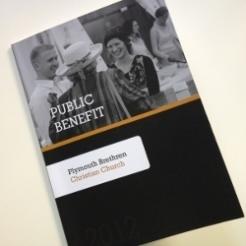The Charity Commission has concluded that the Preston Down Trust, a charity that is part of the Plymouth Brethren Christian Church, has been operating in line with its objectives, according to the first monitoring case report published today.
It was registered in January 2014, after a lengthy legal battle between the Commission and the Plymouth Brethren. At the time of registration the Commission said it would review how the charity operated, and has today published a report.
The Trust initially applied for charitable status in 2009 but the Commission refused to register it as a charity until 2014, on the basis of concerns that it was not “established for exclusively charitable purposes for the public benefit”.
The Brethren Church has around 16,000 members in the UK and operates a strict doctrine of separation that forbids members from eating, drinking and socialising with non-members.
The Trust’s registration as a charity in 2014 was granted on the basis that it comply with a new “deed of variation” that ensured it worked to “advance the Christian religion for the public benefit” and comply with “other charitable purposes connected with the Brethren”.
The Commission said it has kept a close eye on the Trust since registration was granted two years ago – but concluded today that “trustees were taking steps to ensure it was a well-run charity” and found no “evidence of significant issues relating to the charity’s compliance with the governing document and promises made”.
While the regulator said it identified “some governance and financial issues” - including an out of date conflict of interest and safeguarding policy - it said it provided effective regulatory advice and an action plan to the charity for the future.
Michelle Russell, director of investigations, monitoring and enforcement at the Charity Commission said it was “important that the commission took this monitoring action, given the public interest in the registration of this charity”.
“In doing so, the Commission has provided public assurance that the charity is complying with the assurances it gave at registration, and ensures compliance on the issues that the trustees need to address,” she said.
“Part of our role as registrar includes protecting the integrity of charitable status through our registration gateway to ensure only charitable bodies are registered. It is vital that from day one, trustees of charities recognise the importance of complying with charity law and start on the right footing.
"Trustees must ensure that their charity operates for the public benefit not just at registration stage but going forward, and ensure they follow charity law at all times,” she said.
The regulator's investigation found "no evidence that members of the public had encountered difficulties in accessing meetings" - despite finding that only one new person attended meetings since the Trust was registered.
It also found "evidence of public interaction", including "cleaning car parks, village hall tidy ups, snow wardens, litter clearing, repairing coastal defences and work within the local hospital and prison".
The Preston Down Trust was approached by Civil Society News for comment but did not respond by the time of going to press.
Nearly 100 Bretheren charities registered
The Preston Down Trust was the first of the Bretheren groups to adopt the new deed of variation to enable it to be accepted onto the register of charities.
According to today's report there are more than 200 Bretheren gospel halls and so far 96 have adopted the new deed of variation and joined the register.
The Commission will continue to monitor a sample of other registered gospel halls and publish another report.









